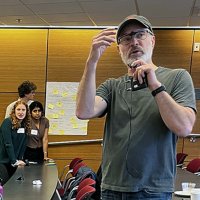
Dr. Justin Fermann is a Chemical Education and Theoretical Computational professor at UMass Amherst and has played a critical role in the creation and continued development of the UMass Integrated Concentration in STEM Program (iCons) as an educational program, serving in multiple roles: instructor, program director, and associate director of academics. This spring semester, Fermann is taking a step back from his major responsibilities as an iCons administrator and will be focusing more on student education. Without Justin Fermann, iCons would not be what it is today and we all thank him.
Fermann remembers his introduction to discovery-based learning as if it happened yesterday. Born and raised in upstate New York, his first exposure to STEM education was through making (mostly breaking) materials as a child. To him, science was always supposed to be fun, especially when the environment is your classroom. As he grew up, he chased this philosophy through all his endeavors and educational opportunities. Fermann graduated with his degree in Theoretical Chemistry from the University of Georgia and arrived at UMass Amherst in 1996 as a PostDoctoral researcher working with Prof. William Vining designing and writing chemical education software.
![]() When iCons first began to take shape in 2009, Fermann was there to help move the program forward. Alongside Scott Auerbach and other STEM educators, he worked to create an environment that encouraged risk-taking and designed and established learning spaces for those that entered the program. Unlike many professors at the time, he saw the value of innovation. iCons is designed for students who are not satisfied with stock answers and who are powered by their inquisitiveness.
When iCons first began to take shape in 2009, Fermann was there to help move the program forward. Alongside Scott Auerbach and other STEM educators, he worked to create an environment that encouraged risk-taking and designed and established learning spaces for those that entered the program. Unlike many professors at the time, he saw the value of innovation. iCons is designed for students who are not satisfied with stock answers and who are powered by their inquisitiveness.
Fermann was one of the founding instructors for the first iCons class in Spring 2011. Teaching in iCons presented a unique opportunity to foster his sense of curiosity. Here, he bridged the gap between traditional scientific education and contemporary innovation. As an educator, the iCons Program empowered Fermann, ultimately giving him the opportunity to enhance students’ learning environment.
![]() Thinking outside the box and becoming an active collaborator is inevitable in his classroom. He believes it is within an individual’s own ability to figure things out, and readily encourages it. In the classroom, Fermann is not an authoritative figure. He says, “By explicitly putting students in spaces where they are the authority, they become content experts, which is very empowering.”
Thinking outside the box and becoming an active collaborator is inevitable in his classroom. He believes it is within an individual’s own ability to figure things out, and readily encourages it. In the classroom, Fermann is not an authoritative figure. He says, “By explicitly putting students in spaces where they are the authority, they become content experts, which is very empowering.”
"I appreciated the way he challenged us to think critically and creatively, while still giving us the freedom to explore our own ideas and perspectives. His encouragement and guidance was instrumental in my growth as a student," said one iCons alumna about her experience being taught by Fermann in ICONS 189H.
When asked what he hopes students remember from his classrooms, ten years from now, Fermann wishes that, “students remember that they felt included, valued, and supported while they were there; that their time was used effectively, and that the value they got from the class has grown over time.”
Whether bouncing theories off one other, structurally developing chemical models or creating glass-blown art, Justin Fermann welcomes student curiosity with open arms. He has created a safe environment where students should not be afraid to fail. As students prepare to enter the developing global workforce, no characteristic is more important.
Stay Connected